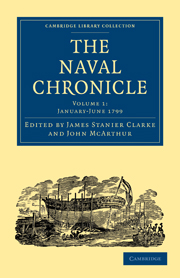 The Naval Chronicle
The Naval Chronicle Book contents
- Frontmatter
- PREFACE TO THE FIRST VOLUME
- BIOGRAPHICAL MEMOIR OF EARL HOWE
- BIOGRAPHICAL MEMOIR OF ADMIRAL SIR CHARLES KNOWLES, BART
- MEMOIRS OF NAVIGATION AND COMMERCE, FROM THE EARLIEST PERIOD
- BIOGRAPHICAL MEMOIR OF THE RIGHT HONOURABLE ALEXANDER ARTHUR HOOD LORD BRIDPORT
- BIOGRAPHICAL MEMOIR OF THE LATE RIGHT HONOURABLE GEORGE BRYDGES, LORD RODNEY, K.B.
- HITORICAL MEMOIR OF NAVAL TRANSACTIONS, DURING THE PRESENT WAR, FROM ITS COMMENCEMENT IN 1793
- MEMOIRS OF NAVIGATION AND COMMERCE, FROM THE EARLIEST PERIODS
- INDEX
- STATE OF THE ROYAL NAVY OF Great Britain, AT THE COMMENCEMENT OF THE YEAR 1799
- THE Marine List OF SHIPS LOST, DESTROYED, CAPTURED, AND RECAPTURED, &c.
- APPENDIX. No. IV
BIOGRAPHICAL MEMOIR OF ADMIRAL SIR CHARLES KNOWLES, BART
Published online by Cambridge University Press: 10 January 2011
- Frontmatter
- PREFACE TO THE FIRST VOLUME
- BIOGRAPHICAL MEMOIR OF EARL HOWE
- BIOGRAPHICAL MEMOIR OF ADMIRAL SIR CHARLES KNOWLES, BART
- MEMOIRS OF NAVIGATION AND COMMERCE, FROM THE EARLIEST PERIOD
- BIOGRAPHICAL MEMOIR OF THE RIGHT HONOURABLE ALEXANDER ARTHUR HOOD LORD BRIDPORT
- BIOGRAPHICAL MEMOIR OF THE LATE RIGHT HONOURABLE GEORGE BRYDGES, LORD RODNEY, K.B.
- HITORICAL MEMOIR OF NAVAL TRANSACTIONS, DURING THE PRESENT WAR, FROM ITS COMMENCEMENT IN 1793
- MEMOIRS OF NAVIGATION AND COMMERCE, FROM THE EARLIEST PERIODS
- INDEX
- STATE OF THE ROYAL NAVY OF Great Britain, AT THE COMMENCEMENT OF THE YEAR 1799
- THE Marine List OF SHIPS LOST, DESTROYED, CAPTURED, AND RECAPTURED, &c.
- APPENDIX. No. IV
Summary
After a life of generous toils endur'd,
The Gaul subdu'd, or property secur'd,
Ambition humbled, mighty cities storm'd,
Or laws establish'd, and the world reform'd;
Clos'd their long glories with a sigh to find
Th' unwilling gratitude of base mankind!
Pope.To preserve the laurel which Fame had planted around the tomb of the naval hero, is a duty, whose importance is very sensibly impressed on our minds. We are anxious not only to relate the brilliant achievements of the present age; but, as it were, to renovate those splendid actions that have been dimmed by the political atmosphere in which they appeared, and whose glory was shorn of its beams by the envious and calumniating spirit of the day.
Admiral Sir Charles Knowles was the son of an Earl of Bambury, and a French gentlewoman of rank and uncommon beauty. She was much noticed by Lady Wallingford, and also enjoyed in a considerable degree the friendship of the Duchess of Dorset.
The Earl of Bambury, father to Mr. Knowles, appears to have been ill calculated for a consort so amiable and accomplished. Having dissipated about 20,000l. abroad in fashionable vices, and acquired that knowledge of the world which is esteemed so essential a finish to a liberal education; he left his son to form himself for the future service of his Country in the school of adversity, which gradually established the firmness of his character, and produced an habitual patience under fatigue or disappointment.
- Type
- Chapter
- Information
- The Naval ChronicleContaining a General and Biographical History of the Royal Navy of the United Kingdom with a Variety of Original Papers on Nautical Subjects, pp. 89 - 176Publisher: Cambridge University PressPrint publication year: 2010First published in: 1799


